
Mayflower Historic Sites
America’s Hometown: Plymouth, Massachusetts
Plymouth is a quintessential New England town conveniently nestled between Boston and Cape Cod. Plymouth is home to not only the Pilgrim story but iconic landmarks, cranberry harvests, ocean views, and charming accommodations.
Visit the Mayflower Society List of Recommended Attractions, located in Plymouth and nearby surrounding towns.
The Alden Family Sites
On the National Register of Historic Landmarks, the John and Priscilla (Mullins) Alden Family sites consist of two properties in Duxbury. The first property, the Alden Homestead Site, contains the archaeological remains of the house John Alden built about 1630. The second property, the John Alden House, is a historic house museum that was purportedly home to John and Priscilla (Mullins) Alden, but by forensic analysis, judged to have been built around 1700, probably by John Alden’s grandson. The property has been under continuous ownership of the Alden Family and it is now managed by a family foundation.
John and Priscilla (Mullins) Alden Family sites are located at 105 Alden St., Duxbury, MA 02332.
Burial Hill
Burial Hill is an historic cemetery or burying ground and the burial site of several Pilgrims. There are grave markers and monuments for the following families: Bradford, Howland, Brewster, Cushman, Bartlett and Warren.
Burial Hill is located on School Street in Plymouth, MA 02360.
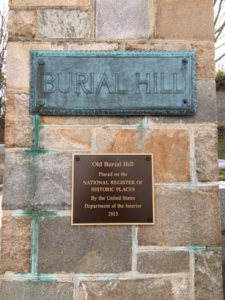
Cole’s Hill: the Sarcophagus and Statue of Massasoit
Cole’s Hill is a National Historic Landmark used by the Mayflower Pilgrims to bury their dead. A number of memorials and monuments are on the hill including a statue of the Wampanoag sachem Massasoit and a granite sarcophagus erected by The Mayflower Society in 1920 which contains the skeletal remains believed to be those of the original Mayflower settlers.
Cole’s Hill is located along Carver Street near the foot of Leyden Street and across the street from Plymouth Rock.
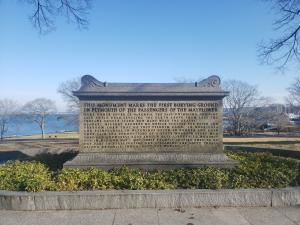

The Harlow Old Fort House
The Harlow Old Fort House is an historic First Period house in downtown Plymouth. Sergeant William Harlow built the house in 1677 using timbers from the Pilgrims’ original 1620-21 fort on Burial Hill. His house projects the Pilgrim home and way of life.
The Harlow Old Fort House is located at 119 Sandwich St., Plymouth, MA 02360.
John Howland’s Homestead Site and Plaque
The Pilgrim John Howland Society owns both the site of John Howland’s homestead where he and his wife Elizabeth (Tilley) Howland lived from 1638-1672/3, and the site of Joseph Howland’s homestead across the road from his father’s house and farm. Both sites are marked with monuments, and have been the sites of multiple excavations.
John Howland’s homestead is located at 67 Howlands Lane, Kingston, MA 02364
The Jabez Howland House
The Jabez Howland House is an historic house museum that has been restored and decorated with 17th-century period furnishings. The oldest portion of this two-story wood frame house was built by Jacob Mitchell in 1667, and purchased by Jabez Howland, son of Mayflower Pilgrims John Howland and Elizabeth (Tilley) Howland. John and Elizabeth lived in the home with Jabez for a short time making it the only existing house in Plymouth where Pilgrims have actually lived.
The Jabez Howland House is located at 33 Sandwich Street, Plymouth, MA 02360.
The Jenney Interpretive Center
The Jenney is dedicated to conveying the impact 51 Pilgrims have had on the founding and ongoing development of the United States and to the importance of passing the history of our country from generation to generation. The museum offers walking tours of the Plymouth historic district and tours of the National Monument to the Forefathers. Educational programs cover topics such as the economics of the Pilgrims and the Pilgrim family. The house, built in 1749, houses a gift shop and three exhibits in the Interpretive Centre.
The Jenney is located at 48 Summer St, Plymouth, MA 02360.
Leyden Street, Plymouth
Originally named First Street, Leyden Street is a street in Plymouth that was created in 1620 by the Pilgrims, and claims to be the oldest continuously habited street in the Thirteen Colonies of British North America. Governor William Bradford, Samuel Fuller, Peter Browne and other settlers owned lots on the road and assorted plaques are affixed on each residence to tell of their history.
Leyden Street, Plymouth, MA 02360
Mayflower II
The Mayflower II, built in Devon England, is a replica of the 17th-century ship Mayflower that transported the Pilgrims to the New World.
The Mayflower II, is located at Pilgrim Memorial State Park Pier, MA-3A, Plymouth, MA. 02360.

Mayflower Meetinghouse
Since the Mayflower Pilgrims’ first Meetinghouse was built at the top of Leyden Street in Plymouth in 1621, a place of spiritual ministry has continued to this day.
The Mayflower Meetinghouse (formerly the National Pilgrim Memorial Meetinghouse) is the fifth spiritual structure built on this location and, in 2014, was added to both the National Register of Historic Places and the List of Massachusetts’ Most Endangered Resources.
Since the General Society of Mayflower Descendants was founded in 1897, the same year the present structure was built at the top of Leyden Street, families of descendants – our families – have made regular pilgrimages to this spot. In fact, our Member Societies have helped to furnish this structure with Tiffany stained-glass windows from the New York and New Jersey Societies, objects in the sanctuary from Rhode Island, as well as many other contributions through the years.
To save the building they love, the First Parish Church congregation, former owners of the Mayflower Meetinghouse, agreed to donate it to The Mayflower Society upon the condition that funds be put in place to permanently maintain it, and that they be allowed to continue scheduling their services there.
The Mayflower Meetinghouse is located at 19 Town Square, Plymouth, MA 02360.
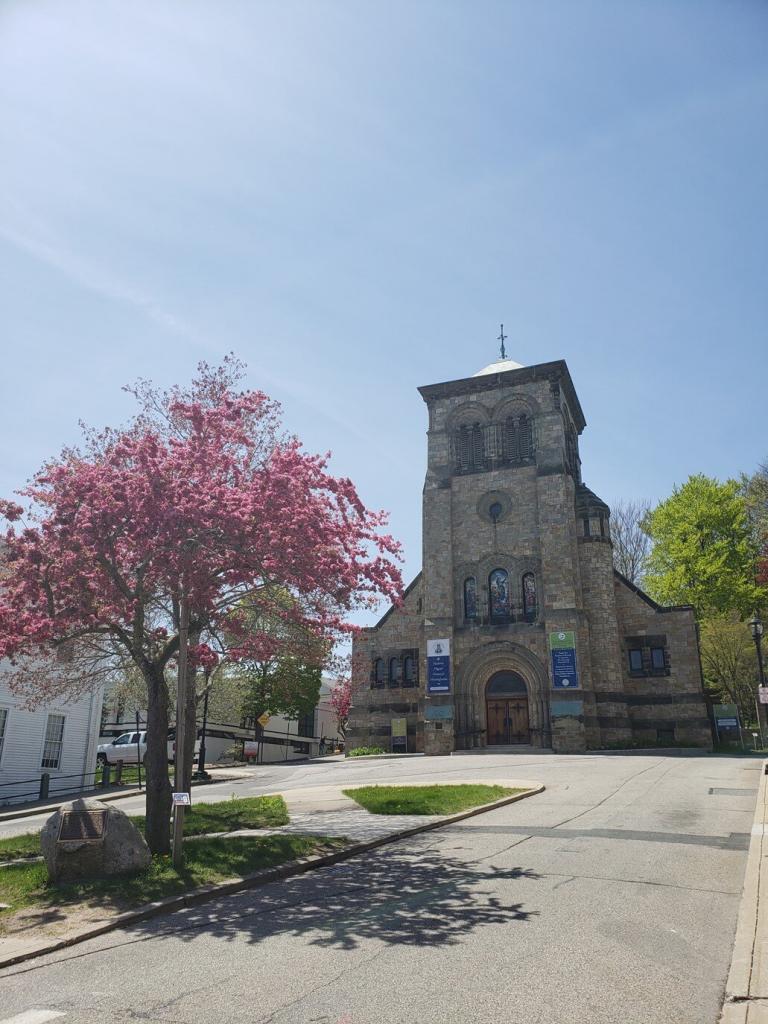
Mayflower Society House and Colonial Revival Gardens
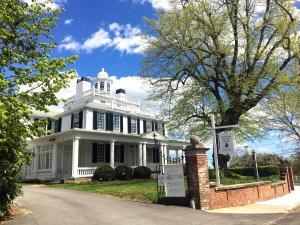 The Mayflower Society House is an 18th-century period historic house museum operated by The Mayflower Society. The mansion was originally built in 1754 by loyalist Edward Winslow, the great-grandson of Pilgrim Edward Winslow. The Society house’s history spans over three centuries,
The Mayflower Society House is an 18th-century period historic house museum operated by The Mayflower Society. The mansion was originally built in 1754 by loyalist Edward Winslow, the great-grandson of Pilgrim Edward Winslow. The Society house’s history spans over three centuries,
and contains many treasures.
The Mayflower Society House is located at 4 Winslow Street, Plymouth, MA 02360.
National Monument to the Forefathers
The National monument to the Forefathers, formerly known as the Pilgrim Monument, commemorates the Mayflower Pilgrims. The monument is free to visit and open to the public year-round. Bring a picnic and enjoy the monuments expansive lawn.
The National monument to the Forefathers is located on Allerton Street, Plymouth, MA 02360.
Pilgrim Hall Museum
Pilgrim Hall Museum is the oldest continuously operating public museum in the Unites States, having opened in 1824. The museum contains artifact collections, artwork, a library and archives. Prominent pieces include original Pilgrim-era artifacts, such as the original Brewster Chair, a 1651 portrait of Edward Winslow (the only known contemporaneous Pilgrim portrait) and a portion of Plymouth Rock visitors are permitted to touch.
Pilgrim Hall Museum is located at 75 Court St., Plymouth, MA 02360.
Plimoth Grist Mill
Formerly known as the Jenney Grist Mill, the Plimoth Grist Mill is a working grist mill in downtown Plymouth. It is a reconstruction of the original 1636 mill, and was completed in 1970.
The Plimoth Grist Mill is located at 6 Spring Lane, Plymouth, MA 02360.
Plimoth Patuxet
Plimoth Patuxet, founded in 1947, is a living history museum that exhibits, through topography and reenactors, the original settlement of the Plymouth Colony established in the 17th century by the Mayflower Pilgrims. The museum started with two English cottages and a fort on Plymouth’s historic waterfront. Since then, the Museum has grown to include Mayflower II, the English Village, the Wampanoag Homesite, the Hornblower Visitor Center, the Craft Center, the Maxwell and Nye Barns, and the Plimoth Grist Mill.
Plimoth Patuxet is locted at 137 Warren Ave, Plymouth, MA 02360.
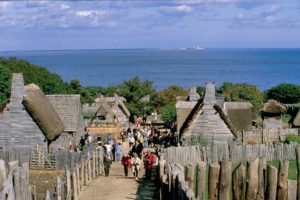
Located in Pilgrim Memorial State Park on the shore of Plymouth Harbor, Plymouth Rock is the world-famous symbol of the courage and faith of the Pilgrims who founded the first New England colony in 1620.
Located at 79 Water Street, Plymouth, MA 02360.
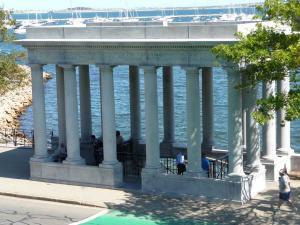
Sacrifice Rock
Sacrifice Rock is a historic Native American site in the Pine Hills region of Plymouth. Centuries before the arrival of English settlers in the area, generations of Wampanoag and other native people en route between Plymouth and points south and west placed offerings, perhaps a gesture of sacrifice, or to receive the blessing of safe passage, on Sacrifice Rock. It is owned by the Antiquarian Society.
Sacrifice Rock is located at 394 Old Sandwich Road, Plymouth, MA 02360.
Soule Homestead Education Center
The Soule Homestead mission is to teach people where their food comes from and promote sustainable agriculture, which requires open fields for crops and grazing. Many people visit the Farm to learn about agriculture and others come to the farm to enjoy the open space. We have scenic vistas in every direction, from sunrise to sunset, that inspire the creative side of our visitors and help them recharge. Visitors to Soule often speak of the feelings of peace and well-being they experience walking around.
The Soule Homestead Education Center it located at 46 Soule Street, Middleborough, MA 02346.
Legs of Myles Standish Statue
These 12 ft. tall, 9-ton granite legs belong to the original Myles Standish statue funded in 1876 by a group of local, cranberry-growing citizens. The original statue was 18-feet tall and had Standish holding a sword in one hand and the charter of the Colony in the other. In 1922, the statue was struck by lightning, destroying the top half. These legs were found in Quincy Quarry in the 1990s. A replica of this statue currently stands in Duxbury, built five years after the original was damaged.
This attraction is located at 20 Dwight St, Halifax, MA 02338.
